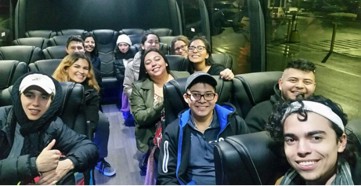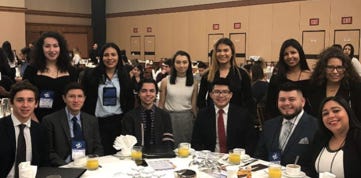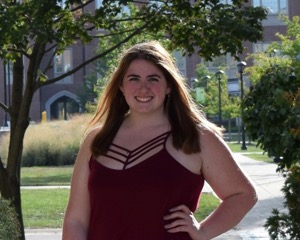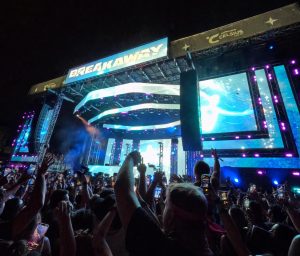LASA stopped by Border Patrol

Several members of LASA on the train to the conference. Photo from Instagram.
Sep 2, 2018
“Those agents felt that you were un-American, that you were the other,” said Gabriella Flores.
Flores, the vice president of the Latin American Student Association, is describing her personal reaction to being questioned by Border Patrol about her citizenship status, while returning from a trip sponsored by LASA.
LASA is an organization that allows for cultural identification on campus for Latinx students and is open to anyone interested in the culture.
This is the second consecutive year that LASA has had the opportunity to travel to Chicago and attend The United States Hispanic Leadership Institute, which is a national conference that attracts various underrepresented groups to empower them and prepare them for the future.
After spending a weekend listening to speakers, attending leadership sessions and networking with successful individuals, LASA was headed back to John Carroll to share their experiences from the conference.
While on the Amtrak ride back, the train was on a routine stop in Toledo when Border Patrol boarded the train. Several members of LASA were in the back cart of the train, doing homework, playing Uno or just hanging out with the other LASA members. Carlos Cruz, a member of the group, was sitting in the first car that is meant for those people who wanted to relax and sleep.
When Cruz realized that Border Patrol was on the train, he texted the other members of LASA to give them a warning about the officers. “He was trying to give us a heads up. From his perspective, they went up to the front of the train and used their flashlights to look at individuals, came to the back of the cart and as they passed again they noticed Carlos looking at them and made eye contact,” said Brenan Betro, president of LASA.
Betro continued, “They approached with a smirk and asked if he was an American citizen. Carlos replied, ‘Why wouldn’t I be?’”
LASA members felt as though they were being racially profiled by Border Patrol. Both Betro and Flores attested to the officers only specifically asking members of LASA about their citizenship status. “They asked no one else. Only LASA members were questioned,” explained Betro. Both students agreed the the flashlights were meant as a means to detect skin color.
Betro discussed his personal emotions and reactions to the occurrence. “We advocate these things all the time, see it in the news and speak out against it, but for a lot of us it was the first time that we have dealt with it in person. It made an impact that a lot of things have changed and it is more relevant in places it wasn’t before,” reflected Betro.
When arriving on campus, LASA members felt uncomfortable and untrusting of their surroundings, considering they only make up around three percent of students on campus. Betro explained, “A lot of us had trouble adjusting back into campus life. You feel more isolated and alone because you just feel like you are by yourself. When you get targeted like that, you feel like you don’t have that group support.”
Betro stated, “I was really proud of the group and how they handled it and looked out for the group as a whole.” Both leaders agreed that the group handled the difficult situation very respectfully.
After this experience, LASA members are trying to explain this experience and share it with others in the community. Flores closed on an uplifting note, “Just try to be informed and educated about the issues, speak with a premise to any argument, have logic behind any viewpoint, respect behind any belief and always remember to listen.”













